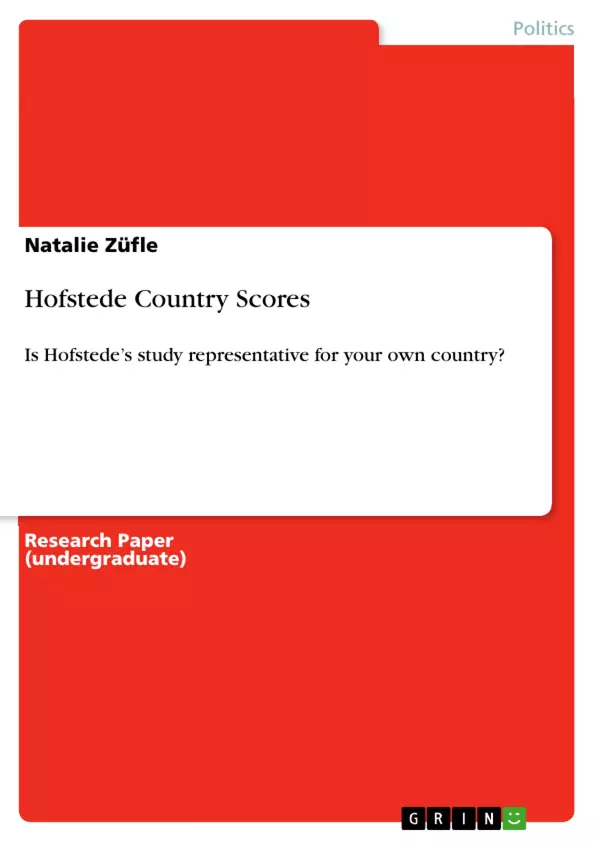Between 1967 and 1973 the Dutch sociologist Geert Hofstede carried out a study based on a questionnaire with the aim of showing how culture influences values in the workplace, and how to differentiate cultures in general. Therefore, he defined 5 dimensions of major importance (Hofstede 2003). Subsequently, I will outline my opinion with regard to the scores of my native country Germany. I will relate these results alternately to the scores of two other countries/regions I know, namely Colombia and Lebanon (i.e. the Arab World). I am going to illustrate some examples; however, the listing won’t be final.
Inhaltsverzeichnis (Table of Contents)
- Power Distance (PDI)
- Individualism (IDV)
- Masculinity (MAS)
- Uncertainty Avoidance Index (UAI)
- Long-Term Orientation (LTO)
Zielsetzung und Themenschwerpunkte (Objectives and Key Themes)
This essay aims to analyze the cultural dimensions of Germany, Colombia, and the Arab World (represented by Lebanon) through the lens of Geert Hofstede's 5D Model. The essay aims to determine if Hofstede's scores accurately reflect the cultural values of these countries.
- Power Distance (PDI): The degree of inequality between individuals and the extent to which this is accepted.
- Individualism (IDV): The degree to which individuals are integrated into groups.
- Masculinity (MAS): The distribution of roles between genders.
- Uncertainty Avoidance Index (UAI): Tolerance for uncertainty and ambiguity.
- Long-Term Orientation (LTO): Values associated with long-term planning and tradition versus short-term focus and immediate gratification.
Zusammenfassung der Kapitel (Chapter Summaries)
The essay examines each of Hofstede's five dimensions in relation to the three countries. For each dimension, the author compares the scores of Germany, Colombia, and the Arab World (represented by Lebanon), offering examples and observations based on their personal experience. The author evaluates the accuracy of Hofstede's scores in light of current societal conditions and offers adjustments where applicable.
The analysis suggests that while Hofstede's model provides a valuable framework, the scores may need to be reevaluated in light of contemporary societal changes. The essay concludes that measuring culture through statistical data is a complex undertaking, and further research is needed to develop a more nuanced understanding of cultural differences.
Schlüsselwörter (Keywords)
This essay explores the cultural dimensions of Germany, Colombia, and the Arab World, utilizing Hofstede's 5D Model. Key themes include power distance, individualism, masculinity, uncertainty avoidance, and long-term orientation. The essay also considers the impact of globalization, economic factors, and societal changes on cultural values.
Frequently Asked Questions
What are Hofstede's 5 cultural dimensions?
The five dimensions are Power Distance (PDI), Individualism vs. Collectivism (IDV), Masculinity vs. Femininity (MAS), Uncertainty Avoidance (UAI), and Long-Term Orientation (LTO).
How does Germany score in Power Distance according to Hofstede?
Germany typically scores low on Power Distance, reflecting a culture that values equality and decentralized decision-making compared to countries like Colombia.
What is the difference between Individualism and Collectivism in this model?
Individualism (high IDV) focuses on personal goals and independence, while Collectivism (low IDV) emphasizes group harmony and loyalty to the in-group.
What does the Uncertainty Avoidance Index (UAI) measure?
UAI measures a society's tolerance for ambiguity and uncertainty. High UAI cultures prefer strict rules and structured situations to minimize risk.
Are Hofstede's country scores still accurate today?
The author evaluates these scores critically, suggesting that while they provide a framework, globalization and societal changes may require reevaluating specific country rankings.
- Arbeit zitieren
- Natalie Züfle (Autor:in), 2009, Hofstede Country Scores, München, GRIN Verlag, https://www.grin.com/document/180071



